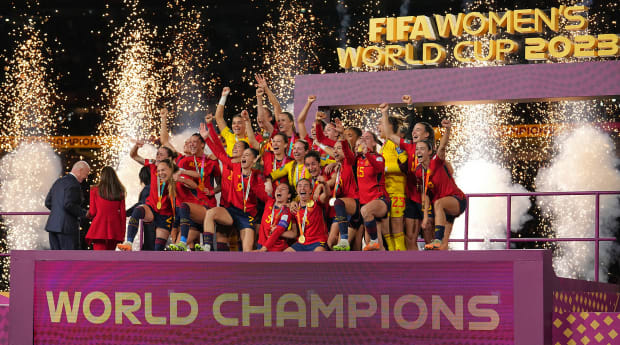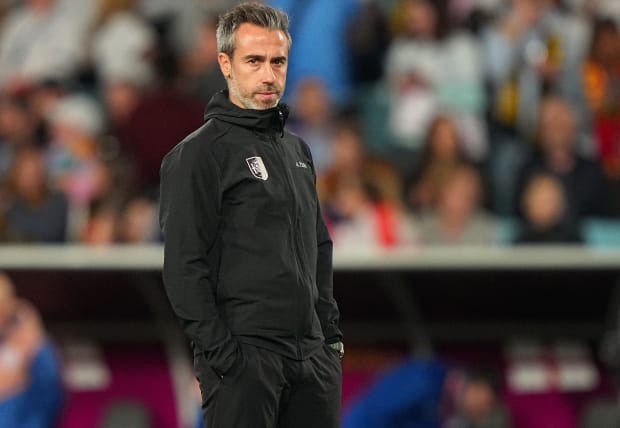A heap of Spanish players collapsed onto the Stadium Australia pitch in tears—after a 103-minute, 1–0 triumph over England, La Roja were crowned Women’s World Cup champions for the first time. As the gravity of the moment continued to sink in, the band of emotional Spain players celebrated on the field, while manager Jorge Vilda gleefully embraced his staff near the touchline. Eventually, however, the two masses merged, sharing in their revelry.
All eyes were on the trophy presentation, with the frosty relationship between La Roja and their coach now well-documented. Whatever insights could or couldn’t be gleaned from dissecting the two groups’ body language, the players should be applauded for their tremendous feat: fielding a dominant run at the World Cup amid uncertainty and turmoil, achieving the unthinkable. Spain’s story may be one of contradictions, but it's also one of beautiful football, club investment and global dominance.

Erick W. Rasco/Sports Illustrated
Less than a year before hoisting the World Cup trophy, the Spanish women’s national team hit a low point, with 15 players issuing a letter to the Royal Spanish Football Federation (RFEF) condemning their working conditions. The players said the national team environment was impacting their physical and emotional health, and asked not to be considered for a call-up for the team’s fall friendlies. Three of those 15 dissenting players were present for the World Cup, including 2023 Golden Ball winner Aitana Bonmatí. Two-time Ballon d’Or winner Alexia Putellas, who also made the World Cup team, showed support for her teammates but was away from the squad recovering from an ACL tear at the time of the letter. While a handful of athletes returned to the team, other stars including veteran defender Mapi León, remained off the World Cup roster, citing issues with the Spanish federation’s treatment and response to the players' complaints. The RFEF has consistently backed Vilda and dismissed the players' appeals, warning that rejecting a national team call-up could result in serious infractions, imploring the players to “accept their mistake and ask for forgiveness.”
With little resolved ahead of the team’s trip Down Under, skepticism began to mount around Spain’s World Cup chances amid such division. However, on the pitch, La Roja looked anything but disjointed, dazzling with their attractive possession-based style of play. Aside from a 4–0 trouncing at the hands of Japan, Spain looked like the most in-sync and complete group of the tournament. La Roja has long pushed women’s football into new realms, retaining the ball, in what has been called a tiki-taka approach, but now all that passing also came with some bite. With the introduction of young players like 23-year-old Olga Carmona and 19-year-old sensation Salma Paralluelo, came an efficiency in the final third, finishing being the team’s missing ingredient.
As the pieces continued to come together on the pitch, the spotlight persisted on the team’s off-field strife. There was some level of acquiescence between the federation and players to note, including a visit from Vilda to FC Barcelona training camp ahead of the World Cup, expanding the national team’s staff and enhancing travel arrangements. The RFEF also complied when mid-tournament the players and their families expressed displeasure with the squad’s quiet base camp of Palmerston North, New Zealand, and moving everyone to the more bustling city of Wellington. Those gestures, however consequential, indicate some potential wiggle room for future cooperation. Will that door remain cracked open following Spain’s World Cup Tour de Force? It remains to be seen whether the world title will empower and provide leverage for the players, or embolden the federation to feel vindicated in its decisions.

Erick W. Rasco/Sports Illustrated
It's important to remember (and perhaps a fact the federation should be reminded of) that Spain’s World Cup win is due in large part to a consistent and dedicated investment in the country’s athletes, starting at the club level. La Roja’s success is intrinsically connected to FC Barcelona, which won the UEFA Women’s Champions League in 2021 and ’23, and has sat atop its league for four-straight seasons. Nine players from the Primera División club are on Spain’s national team, with the club and national team enjoying a symbiotic relationship. (In a testament to the club’s ubiquity, there were even two Barcelona players representing the opposing English side in Lucy Bronze and Keira Walsh.)
Barcelona’s professionalization in 2015 served as a major turning point, with the club leaving behind the poor training conditions and haphazard schedules of the past, and instead taking investment in resources for the women’s team more seriously. Cut to the Spring of ’22 and Alexia & Co. are playing in front of two sell-out Camp Nou crowds, smashing the attendance record for a women’s football match as over 91,000 fans packed into the iconic venue. The massive showing only further solidified Barcelona’s undisputed place atop women’s football. The national team, however, never received that same recognition. While considered, and ranked, as one of the best teams in the world, for some reason Spain was not deemed inevitable in the same way Barcelona was at the club level. (To be fair, the national team had a less-than-compelling performance at the 2022 Euro with Vilda at the helm and just months before the letter to the RFEF). Considering the World Cup outcome, not seeing Barcelona’s recent dominance as a barometer for Spain’s ceiling was an oversight.
The country’s supremacy doesn’t stop at the senior level either, Spain is now in possession of the U-17, U-20 and senior World Cup trophies. With heralded youth academies churning out top talent, Spain’s player pool has never looked more menacing. La Roja may have fielded the youngest team at this year’s World Cup, but only three players from the U-17 and U-20 title-winning squads made the roster, so expect a steady stream of skilled players to backfill the senior national team (much to the chagrin of the rest of the world).
Winning the World Cup affords any nation absolute bragging rights, but Spain’s claim as the best in the world has more substance than most. From the captivating way this team plays, to the country’s club prosperity, to the looming next generation, Spain is officially the titan of women’s football, a fact that's been hiding in plain sight for some time. With the world watching and the World Cup cementing Spain’s status, now is a better time than ever to do right by the players, if not for the athletes themselves, then to set up a potential dynasty built on a solid, equitable and fair foundation.







